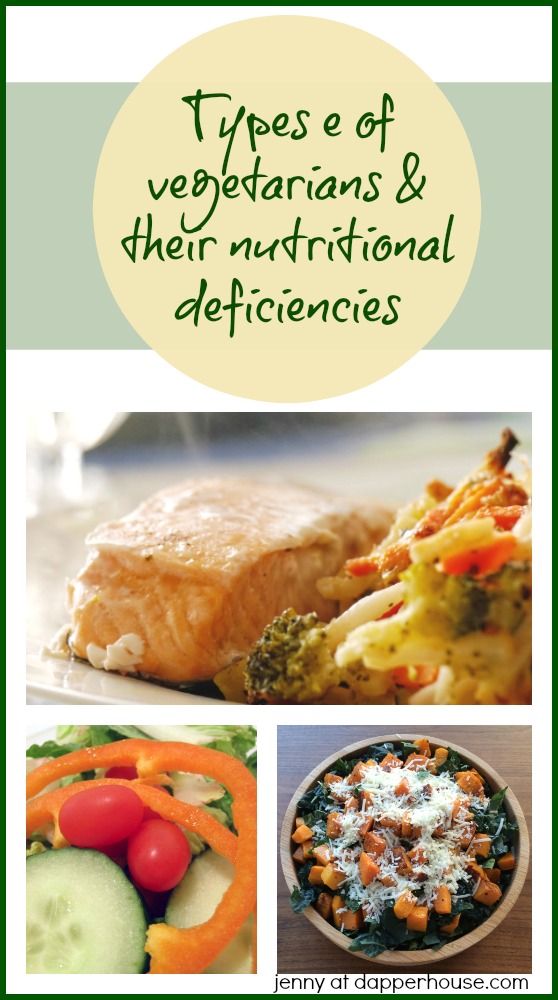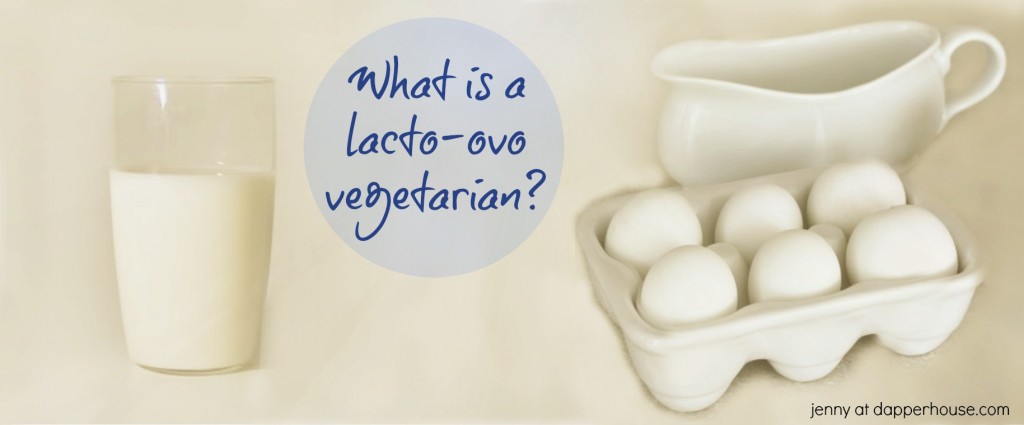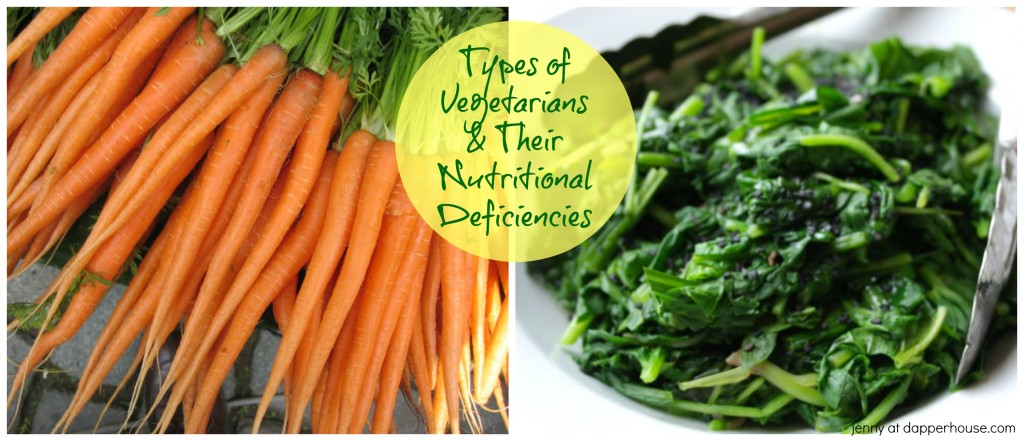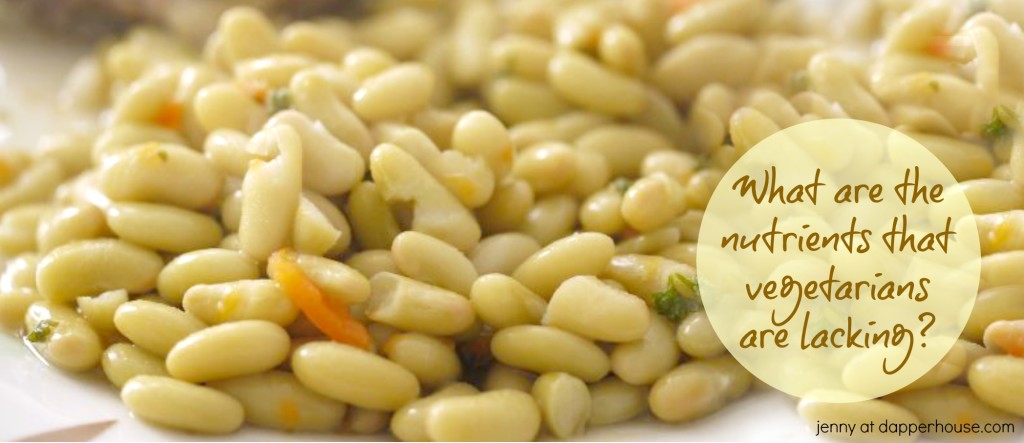This is not a sponsored post. All opinions belong to jenny at dapperhouse.
As many of you know, I am a vegetarian. Being a vegetarian does not equate to being healthy. In fact, it creates many challenges for maintaining healthy nutrition! No matter what type of diet you are on, it is incredibly important to know both your nutritional needs and the food sources that can meet them. When you have restrictions (like not eating meta) it is especially important. I will help you make sense of the types of vegetarians as well as the nutrients that are required to make up for the meat that is not consumed in each category.

Types of Vegetarians
Depending on the “level” of vegetarianism, your available options become more and more limited. Here are the various types of vegetarian diets.
Vegans: DON’T consume red or white meat, fish, fowl, eggs, dairy, gelatin or beeswax in their diets. (Vegans don’t consume any products created by or involving animals. This means no animal products or by-products whatsoever including not using make-up tested on animals, pillows filled with goose down or clothing made of wool, for example.)
Lacto-ovo vegetarians: DON’T: consume red meat, white meat, fish or fowl. They DO: eat dairy products and egg products.
Pollotarian: DON’T: consume red meat or fish and seafood, but DO eat poultry and fowl.

Pescatarians: DON’T eat red meat, white meat or fowl but do allow fish and seafood only. This is the type of vegetarian I am. Some people do not consider pescatarians to be true vegetarians because we still eat sea animals. (So snotty when they are still eating eggs and promoting cow dairies, but whatever) I feel that I can eat fish because fish are too brainless to be considered animals. (JUST KIDDING – no hate mail please) The truth is that I feel I am not meeting my own nutritional needs without including fish in my diet. Particularly for the critical Omega 3 fatty acids needed for my personal health. The word pescatarian gives me a label to quickly explain my dietary restrictions.
Common Deficiencies Found in Vegetarian Diets
If you are any of these types of vegetarian you have to be certain to get the protein, vitamins and minerals that the rest of the population is getting in their animal proteins. Most commonly, the main deficiencies faced by non-meat eaters are:
Omega 3 fatty acids (DHA & EPA)
Fat soluble vitamins (A & D)
Iron
B-12
Calcium
Zinc
Why Vegetarians (and everyone) Need These Nutrients
Omega 3’s are critical to preventing alzheimers, dementia, heart disease, depression, and more.
Vitamins A & D are imperative to a healthy immune system, strand bones, vision and more.
Iron deficiency (anemia) is a serious and debilitations condition causing fatigue and exhaustion to dizziness and chronic infections.
Vitamin B12 is also a critical component of a healthy diet warding off things like cancer, MS, depression, alzheimers, brain damage and mood swings.
Calcium is critical to bone density. It prevents PMS, reduces high blood pressure and high cholesterol. It also reduces colon and rectal cancers.
Zinc is necessary for total immune system function, memory capabilities and good vision. It can prevent acne, pneumonia, ADHD, diarrhea and the common cold.
While many of these essential nutrients are found in meats, they can also be consumed in plant based foods. A vegetarian may have to eat more quantities of certain foods (like dark, leafy greens) in order to meet the daily nutritional requirements. Vegetarians ultimately find that taking daily supplements or eating specifically fortified foods are the only way to consume these essential nutrients.

Top Vegetarian Foods That Contain These Vital Nutrients
Omega 3
seeds like chia, flax and hemp
dark leafy greens like kale, spinach and arugula
beans like mung, navy, soy and kidney
veggies like broccoli, winter squashes,
brussels sprouts and olive oil

Vitamins A
veggies like sweet potatoes, carrots spinach and kale
fruits like cantaloupe, apricots and mangoes
Vitamin D
mushrooms that have been treated with ultra violet light
fortified juices and grain products
supplements
Iron
beans
dark, leafy, green veggies
dried fruits like raisins
iron fortified grains
Vitamin B-12
fortified tofu products
fortified grains
nutritional yeast
Calcium
It is difficult to get calcium from plant based foods so fortified and enriched foods or supplements are the required source for vegetarians.
Zinc
nuts and seeds
wheat germ
breads
beans
leafy green veggies
As you can see, being a vegetarian has some specific nutritional concerns that must be addressed to stay healthy and avoid some pretty crucial medical issues. Depending on what type of vegetarian you are will determine the supplements and food choices that you need to consider each day.
What type of vegetarian are you?
How do you meet your nutritional goals and needs with plant based foods?

Dawn
This was a very interesting read. I’m not surprised that vegans and vegetarians can have vitamin deficiencies. It must be difficult to get everything a body needs from ONLY non meat sources.
Jennifer
My sister is just a hair away from being a registered nutritionist, and she said it’s SUPER hard to get everything you need from only plant sources.
Anne-Marie @ This Mama Cooks! On a Diet
If you’re on any type of restrictive diet where you eliminate one type of food group, it’s probably a good idea to take a multi-vitamin. However, there are plenty of meat eaters who don’t get enough vegetables, too, so they could use a multi as well.
Maria
While I am not a vegetarian anymore, I do believe in eating a nutritionally sound & well-balanced diet. Trying to get as many nutrients from whole foods is probably best.
Danielle
This was pretty interesting. I, myself, eat meat and don’t think I could do without it. I don’t think I’d have the self-control to eat everything I needed to to get all the nutrients we require if I were a vegetarian. I’d probably need supplements or something.
lisa
This is great info. I am a meat eater but sometimes I just can’t take it. There are days I skip out on the meat.
Liz Mays
I guess it’s super important to monitor your nutrient intake if you become a vegetarian. I’m not a vegetarian but I eat very little meat.
Mama to 5 BLessings
I had no idea. What great information. I had no idea!
Autumn @Mamachallenge
I did not know Pescatarians were a type of vegetarian. I can understand why so many vegetarians have vitamin deficiencies.
Vera Sweeney
I had no idea that vegetarians would face nutritional deficiencies like this!! It makes sense now in retrospect great information!
kristin
so many vitamins come from animals. I wasn’t surprised when I read this.
Sandra
If vegans and vegetarians eat variety and enough calories they shouldn’t have a problem.
Stacey- Travel Blogger
Wow, I honestly didn’t know there were so many forms of vegetarians. Thanks for the info!
Jenny Temcio
My friend’s daughter used to be a pescatarian. I remember that she got angry too when people told her she wasn’t a true vegetarian lol!
Elizabeth @ BeingMVP
Wow there are so many types of vegetarians! I’m not one but try to be at least once a week.
Mandi
I knew about the different types of vegetarian, but then I also wonder why we even have to give them all labels. Eat what you want to eat. We’re all humans, so we eat.
Mary Larsen
This is awesome and incredibly informative. I have several friends who are things on your list but I never knew exactly what they were called.
Pamela:: Still Dating My Spouse
Wow what a great post. So full of info
Debi
This is a great post. I have tried to eat as a vegetarian and I always ended up making myself run down and sick